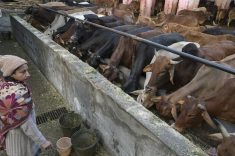WAYWAYSEECAPPO, Man. – The last thing pregnant mare’s urine producers
needed was an attack on the industry that could undermine its very
foundation.
But that’s what equine ranchers are dealing with since a recent
American scientific study challenged the safety of hormone replacement
therapy for post-menopausal women. Some forms of this therapy use
hormones extracted from pregnant mare’s urine.
The study involved more than 16,000 post-menopausal women and began in
1997. It was testing a new form of hormone replacement therapy that
Read Also

Canada-U.S. trade relationship called complex
Trade issues existed long before U.S. president Donald Trump and his on-again, off-again tariffs came along, said panelists at a policy summit last month.
included horse urine-derived estrogen.
It was called off recently, after slightly more than five years,
because the scientists conducting it found that women taking hormone
replacement therapy were experiencing higher rates of heart disease
and breast cancer.
No one knows what the impact of the study’s findings will be.
“It’s not an equine rancher’s situation,” said Manitoba PMU producer
Fred Clement, who is also president of the North American Equine
Ranching Information Council, which represents PMU producers.
“It’s a medical situation. We don’t have any specialized medical
knowledge ourselves.”
Clement said PMU producers are optimistic at the moment. Studies often
contradict each other and swing back and forth in their findings, and
he doesn’t think this particular study, which has received a lot of
media attention, is necessarily the last word.
“It’s just another clinical finding, as far as I’m concerned.”
Pharmaceutical manufacturer Wyeth Ayerst, which uses estrogen in
pregnant mare’s urine to make medicine, had increased the amount of
urine it will buy from producers for the coming 2002-03 season before
the recent spate of bad news.
That led farmers to expand their barns and herds to meet increased
demand.
Theodora Samiotis, a spokesperson for Wyeth Ayerst, said her company
sees the situation as “business as usual” and is committed to hormone
replacement therapy.
Since PMU producers have contracts with the company for the coming
season, Clement said they can sit back and wait to see whether there is
any lasting effect on the business.
“I’ve already got my contract in place for this year,” he said. “What
happens down the road is not something I can control.”
NAERIC spokesperson Carrie Allen said producers don’t make
pharmaceuticals and don’t have direct contact with consumers. They have
to rely on signals they get from Wyeth Ayerst.
“It’s business as usual until we can get a handle on demand for the
product.”
The recent study, which laid out complex findings, is not something PMU
producers are in a position to analyze.
“We have no idea how to interpret it,” she said. “It’s wait and see.”
Allen said reporters from across North America have been bombarding
NAERIC to find out what the study means for PMU producers. She isn’t
able to give a clear answer because she doesn’t know.
Clement said producers are wondering, too.
“It sure got everyone’s attention, that’s for sure.”















